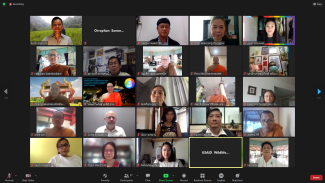Bangkok, July 16, 2021 – The United States Agency for International Development (USAID) and the International Network of Engaged Buddhists (INEB), in collaboration with Thailand’s Department of National Parks, Wildlife and Plant Conservation (DNP) today engaged 30 monks and nuns from 10 temples to champion a campaign to counter spiritual beliefs driving the demand for illegal wildlife products in Thailand.
This brings the Buddhist spiritual leaders who are now championing the wildlife demand reduction campaign to over 100.
At a virtual seminar hosted by the Wat Saket temple in Bangkok, the spiritual leaders developed a plan of action to help reduce consumer demand for wildlife among in their communities. They also produced one-minute videos urging their followers to stop using wildlife products for posting in their social media accounts.
“Buddhist scriptures encourage us to show loving kindness to all beings, including animals. Buddhists try to do no harm, or as little harm as possible, to animals. Spiritual leaders have a crucial role to remind their followers of these teachings and help reduce the use of amulets made from endangered animals,” said Venerable Phra Thep Rattana Muni, Abbot of Wat Saket (Golden Temple).
At the end of the workshop, the monks and nuns signed a poster pledging their commitment to integrate wildlife demand reduction messaging in their dharma sermons and conversations with followers.
“The US government is honored to work with the International Network of Engaged Buddhists as well as all our key partners in the country in deterring wildlife crime and reducing consumer demand for wildlife products. USAID is fully committed to its partnerships with the ASEAN regional and national leadership to deter wildlife crime, conserve ecosystems, and uphold the rule of law and regional stability that underpins a free and open Indo-Pacific region,” said Craig Kirkpatrick, Ph.D., Regional Wildlife Conservation Advisor of USAID Regional Development Mission for Asia.
The virtual seminar is the third and last event in a series that INEB, a global network of Buddhist organizations, has organized to support the “No Ivory, No Tiger Amulets” campaign that USAID Wildlife Asia and DNP launched in March 2020. This campaign is the second phase of the Spiritual Beliefs campaign urging the public to stop using amulets from wildlife products in the belief that these products bring good luck and prevent harm.
According to USAID Wildlife Asia’s 2018 study Research on Consumer Demand for Ivory and Tiger Products in Thailand, beliefs that elephants and tigers bring good fortune and prevent harm fuel the demand for amulets made of these animals’ body parts. The study found out that among the adult urban Thai population, roughly 500,000 own ivory products and around 250,000 use tiger products. In addition, roughly 750,000 intended to buy and use these products in the future. Overall, an estimated 2.5 million adult urban Thais found use of ivory products socially acceptable; 1.8 million adult urban Thais found use of tiger products socially acceptable. The study also revealed that Buddhist monks, along with family elders, are the main influencers of these beliefs.
Engaging spiritual leaders to publicly champion campaigns and amplify messaging against wildlife products will therefore counter these beliefs, reduce the demand for wildlife products, and protect endangered species. An online survey conducted by USAID Wildlife Asia in July 2020 showed that after the first round of media placements for the Spiritual Beliefs campaign, those who agree that ivory and tiger products bring good luck or protect from harm decreased by up to 30 percentage points. Further, the respondents had the highest recall for the Spiritual Beliefs campaign featuring monks and other influential leaders.

